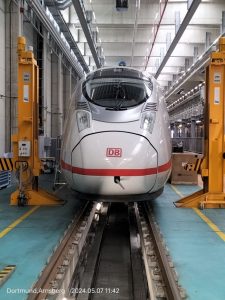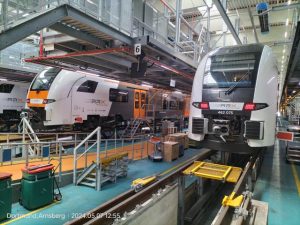Siemens Mobility has invested €150 million in digitising what has become its most modern depot in Germany, which means computerising all train maintenance and diagnostic operations.
The investment at Dortmund Eving in western Germany was unveiled on Tuesday by the company’s management, not missing, of course, Siemens Mobility CEO Michael Peter.
The depot opened six years ago but has been expanded to 87,550 sq m to meet growing demand. The German company says the depot’s availability will be 100% due to the digitised operation of the warehouse and that attractive jobs will be created in the region, namely up to 250 employees at the site in 2026.
Plans call for the construction of an additional 12,300 m² service hall with warehouse, offices and workshops to cope with the maintenance of trains up to 400 metres long (two double trains with a capacity of up to 800 people). Construction of the new building is scheduled to start in 2024 and be completed by 2026. The Siemens Mobility depot in Dortmund previously had a total area of 70,000 m² and will have 157,550 m² when the project is completed.
The new facility will be completed in 2026
“Our customers need the best service to put more trains on the tracks and ensure maximum availability. Our digital service depot in Dortmund is one of the most modern rail service centres in Europe. To maximise efficiency, innovative Siemens technologies such as artificial intelligence-based maintenance with Railigent X, 3D printing and highly automated services are used in the facility. By investing in additional warehousing capacity, we are responding to the growing demand for services. The depot expansion will not only allow us to serve more vehicle and train types and more customers in the future, but will also create highly skilled jobs in the region and further strengthen our service network in Europe,” said Michael Peter, CEO Siemens Mobility.
The Dortmund depot has been operational since 2018. When the new facility is completed in 2026, the service centre will employ up to 250 people. Currently, the Siemens Mobility depot has six electrified lines and mainly services trains in the RRX (regional) fleet operating throughout the Rhine-Ruhr metropolitan region, as well as ICEs. Thanks to its additional capacity, the depot will also be able to service and maintain more trains from other fleets.
All maintenance processes can be controlled fully digitally at the Dortmund depot. This optimises all operations and maintenance and helps to achieve up to 100% system availability. Depot employees receive work orders and all relevant maintenance and repair information directly on their tablets. Trains continuously transmit status data from sensors to the Railigent X digital platform, where it is processed automatically. For example, a high-speed train generates up to 30 GB of data per month. Siemens Mobility’s Railigent X suite of applications analyses this data using artificial intelligence-based algorithms to predict faults as accurately as possible and make preventive maintenance recommendations.
In addition to state-of-the-art inspection and maintenance equipment, including an open-air cleaning facility and an axle diagnostic and turning system, the Rail Service Centre also features a high-performance 3D printer for fast, direct on-site production of plastic spare parts that require urgent replacement.
The advanced Automated Vehicle Inspection [AVI] system at the depot is unique in Germany. When the train or vehicle enters the AVI, it automatically checks the wheels, axles and tread profiles using the latest laser technology and enters the data into Railigent X.
In the future, it should be possible to switch from human vehicle inspections to fully automated visual inspections.
These inspections will be seamlessly integrated into a train’s operations to ensure maximum train availability and increase maintenance productivity. The latest software solutions use advanced technologies such as computer vision, artificial intelligence and digital twins to inspect trains and vehicles as efficiently as possible.
Basically at the time the train enters for repair workers have all the necessary spare parts available because previously the necessary operations are assessed. Trains are also washed every ten days according to contracts signed with transport operators and the water used is recycled. The replacement of air-conditioning filters does not require climbing ladders, as access is also via platforms at the top. Employees only use tools and implements appropriate to their qualifications (for example, a mechanic will not be able to remove an electric tool from the computerised tool shed) and can only take tools out of the shed if they are metrologically checked.
The system will reduce unscheduled out-of-service train departures by 30% and maintenance costs by 50%, Siemens officials explain.
Share on:











